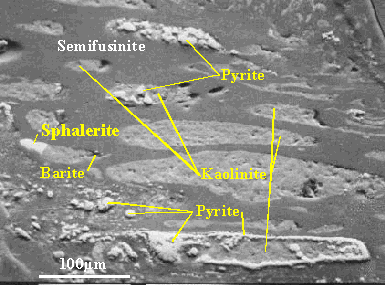 Trace
Minerals in West Virginia Coals
Trace
Minerals in West Virginia Coals Trace
Minerals in West Virginia Coals
Trace
Minerals in West Virginia CoalsBarite is a rare trace mineral in West Virginia coals filling voids
originally present in the peat. In the case shown here, the minerals
barite, sphalerite, pyrite and kaolinite grew within open cavities in semifusinite
("fossil charcoal")  in
the Pittsburgh coal. In semifusinite, the original plant cell walls
were carbonized by fire into strong, pure carbon, remnants of the original
cell walls with openings where the cell contents were located. Dissolved
ions in the peat waters precipitated into various minerals in these voids
as the peat formed. Silicon and aluminum were most abundant and crystallized
into very common kaolinite, Al4(Si4O10)(OH)8,
iron and sulfur formed less common pyrite, FeS2, zinc and sulfur
formed sphalerite, ZnS, and barium and sulfur
formed barite, BaSO4. The sphalerite shown in this SEM
image also contained a significant amount of barium in an unknown association
with the sphalerite. Barite was observed in very low amounts only
9 of 24 coal samples in an unpublished SEM study by the WVGES.
in
the Pittsburgh coal. In semifusinite, the original plant cell walls
were carbonized by fire into strong, pure carbon, remnants of the original
cell walls with openings where the cell contents were located. Dissolved
ions in the peat waters precipitated into various minerals in these voids
as the peat formed. Silicon and aluminum were most abundant and crystallized
into very common kaolinite, Al4(Si4O10)(OH)8,
iron and sulfur formed less common pyrite, FeS2, zinc and sulfur
formed sphalerite, ZnS, and barium and sulfur
formed barite, BaSO4. The sphalerite shown in this SEM
image also contained a significant amount of barium in an unknown association
with the sphalerite. Barite was observed in very low amounts only
9 of 24 coal samples in an unpublished SEM study by the WVGES.
| To request specific information from a Survey geologist click here. |
Page last revised: March 1, 2002
Please send questions, comments, and/or suggestions to webmaster.
Page created and maintained by: West Virginia Geological & Economic Survey Address: Mont Chateau Research Center Cheat Lake exit off I-68 P.O. Box 879 Morgantown, WV 26507-0879 Telephone: 1-800-WV-GEOLOgy (1-800-984-3656) or 304-594-2331 FAX: 304-594-2575 Hours: 8:00 a.m. - 5:00 p.m. EST, Monday - FridayPermission to reproduce this material is granted if acknowledgment is given to the West Virginia Geological and Economic Survey.